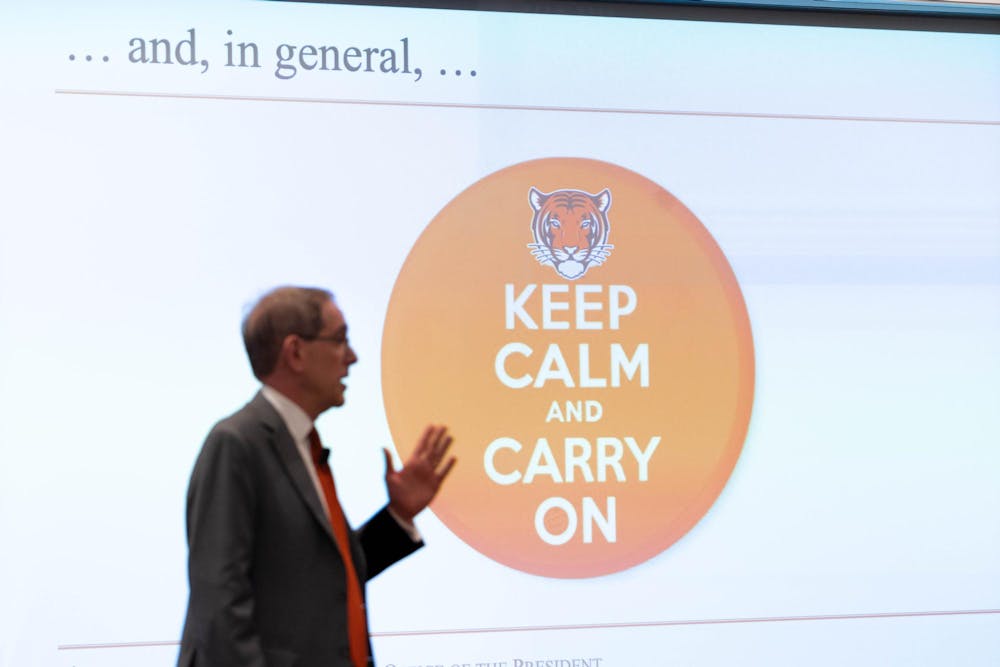University President Christopher Eisgruber ’83 signaled that Princeton would not make concessions to the federal government in an interview with Bloomberg after news broke that the Trump administration had suspended dozens of the University’s research grants.
“I’ve heard you speak about efforts by powerful actors — in government and outside it — who are trying to control the research that scholars do and the classes they teach. How difficult is it to keep a firewall up, keep insulation surrounding this campus, to keep those ‘powerful actors,’ as you put it, out of the classrooms, out of the campus itself?” David Gura, the Bloomberg reporter, asked.
“I think it requires a very firm commitment to principle and a willingness to do hard things. University presidents and leaders have to understand that the commitment to allow academics — including our faculty, including our students — to pursue the truth as best they see it is fundamental to what our universities do,” Eisgruber responded. “We have to be willing to stand up for that. In principle, we have to be willing to speak up, and we have to be willing to say no to funding if it's going to constrain our ability to pursue the truth.”
Eisgruber announced in a campus-wide email earlier on Tuesday that the Trump administration suspended dozens of grants to the University from several agencies, including the Department of Energy, NASA, and the Department of Defense. CNN reported later in the day that, according to the White House and the Department of Education, the Princeton’s grants were suspended pending an investigation into antisemitism on campus. The exact amount paused is unclear.
During the 40-minute interview, Eisgruber acknowledged that there were “rare” manifestations of antisemitism on Princeton’s campus, and he said the University would address “legitimate concerns where they exist.” But he also strongly defended a university’s duty to foster speech.
“We have to stand steadfastly against antisemitism and other forms of hate, but we do that at Princeton through anti-discrimination principles that are broad and that do not incorporate specific definitions of particular kinds of discrimination,” Eisgruber said in the interview, which was conducted in the Mathey Common Room.
In the past few months, once-rare public statements from Eisgruber have increased in frequency as Trump turns up the heat on higher education. In an article in the Atlantic last month, Eisgruber condemned the Trump administration’s cancellation of hundreds of millions of dollars to Columbia University. He reiterated his thoughts during a PBS interview after Columbia announced it would meet the administration’s demands. Now, however, the crosshairs are aimed at his own university.
Eisgruber also said in the Bloomberg interview that the pauses to grants would “undermine our ability to attract talent, and it will make us weaker as a country.”
“A very constructive partnership that’s existed for about 70 years now between American universities and the American government — all that is in danger right now,” he said.
Eisgruber also came close to criticizing Columbia University’s capitulation to federal funding cuts.
“There are other people who urge, ‘Well, are there other ways that you can accommodate the government in some way, or bend to the government’s policy preferences in order to restore funding?’ I think that’s the wrong way, at least, for an academic institution, to be thinking about what its responsibilities are,” he said.
Eisgruber also addressed what the University’s next steps would be.

“If government funding were to go down, we and others would look for other sources that we could use to support the funding to the research that has to take place on our campuses,” he said. “We would look for things that we could stop doing. There would be a real cost to that, because I’m proud of what we're doing on the campus. We would try to raise other funds.”
Eisgruber also broached the topic of examining the endowment, an approach to which he was previously very reticent.
“We would look at ways to potentially reallocate endowment funding, which would involve very difficult choices, but at the end of the day, what would happen here and elsewhere is that less research would get done, and that would be a bad thing,” he said.
Eisgruber also emphasized the need for universities to act together in response to governmental funding cuts.
“I think it’s important for universities to stand shoulder to shoulder as we go forward,” he said.
Devon Rudolph is an associate News editor and staff Sports writer for the ‘Prince.’
Christopher Bao is a head News editor for the ‘Prince.’ He is from Princeton, N.J. and typically covers town politics and life.
Please send any corrections to corrections[at]dailyprincetonian.com








